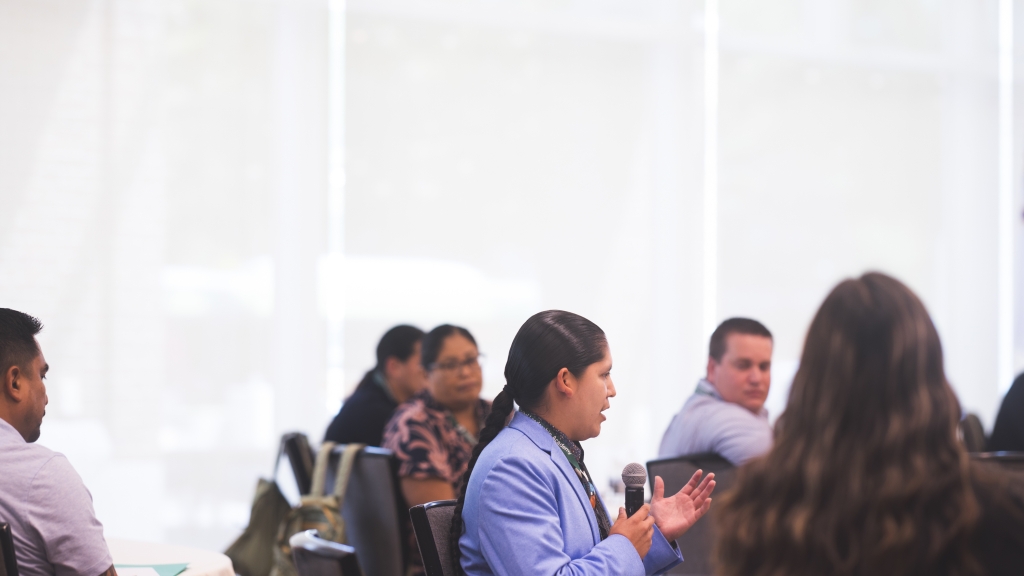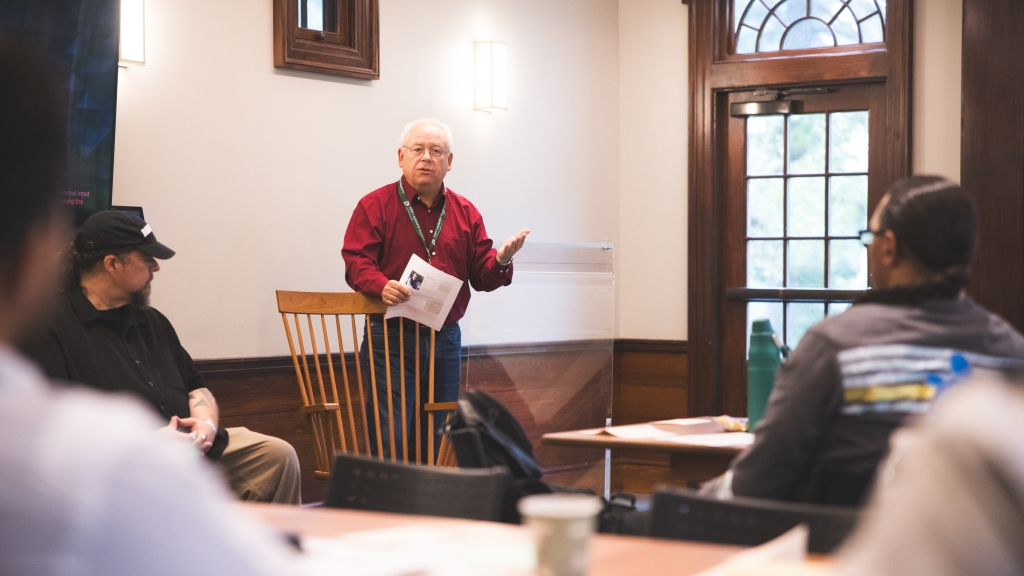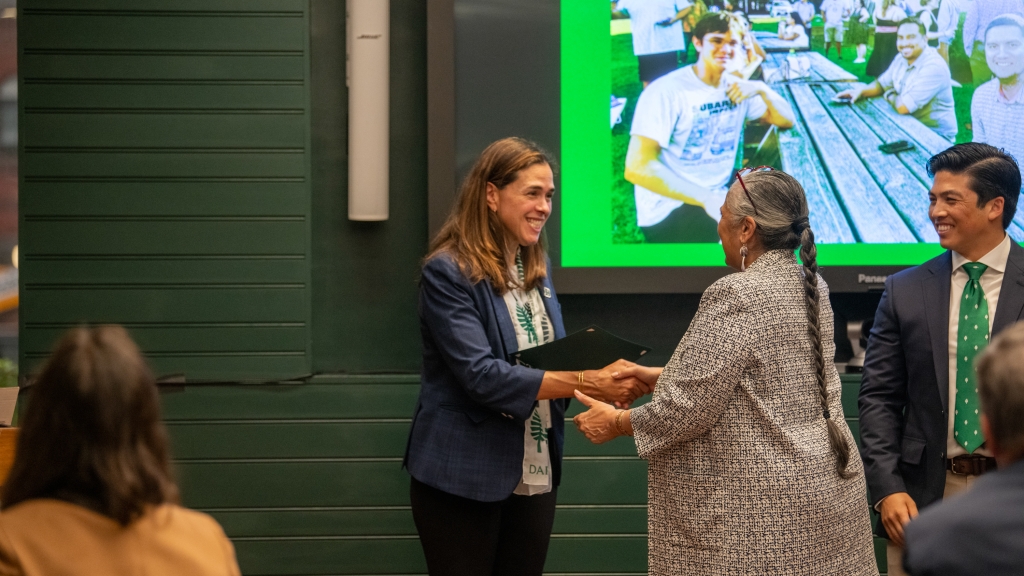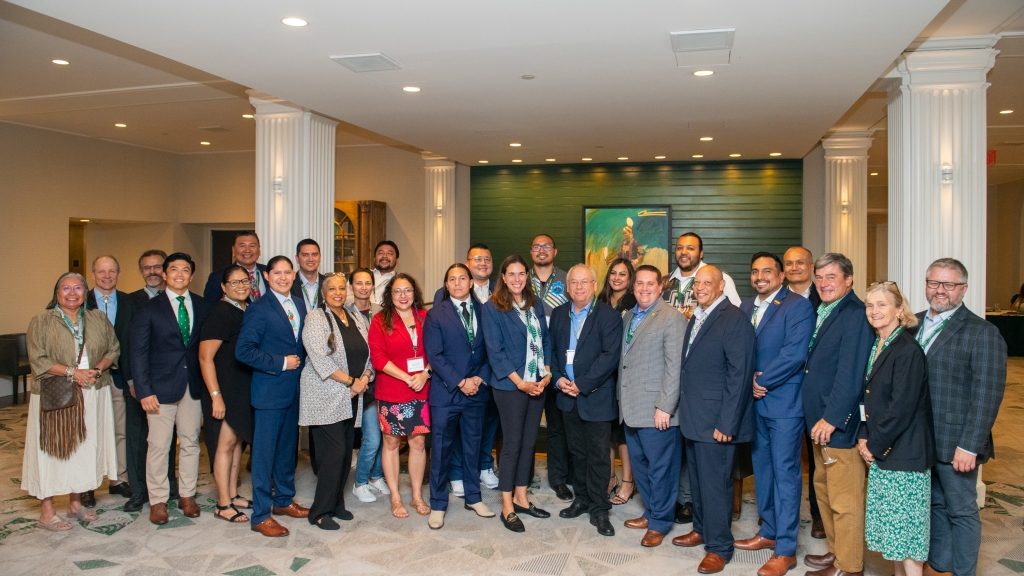The inaugural session of the Tribal Leadership Academy brought 18 leaders from 16 tribes to the Dartmouth campus earlier this month to learn from expert presenters about practical approaches to problem-solving and to connect with peers about the urgent matters they too may face.
The workshops from Aug. 5 to Aug. 9 were designed for tribal officials who are early in their tenures as elected or appointed leaders, and topics ranged from workforce development to the delivery of health care.
Together, the tribes represented comprise a population of more than 616,000 Indigenous people across the country.
N. Bruce Duthu '80, the Samson Occom Professor of Native American Studies and Tribal Leadership Academy faculty director, opened the week by inviting visiting leaders to "think of those who have inspired us and have put their faith in us as we come here for the betterment of our tribes."
Tribal leaders arrived from far-flung locales but came together quickly, going out for coffee, socializing, and learning about each other on a more personal level, including at a dinner with students at Native American House.
Each attendee was asked to bring a draft of a proposal for a tribal initiative, which they continued to develop through the week. The far-ranging proposals included infrastructure, capital investment, better collaboration with states, the green economy, workforce development, and creating tribal foundations to award grants. Health care was an overarching concern, especially in areas of drug addiction and alcohol abuse.
President Sian Leah Beilock attended a small group discussion on project proposals, a session on Law and Order in Indian Country, and a dinner with participants marking the end of the week.

Dillon Shije, a tribal leader from Zia Pueblo in New Mexico, asks a question during one of the sessions. (Photo By Katie Lenhart)
She thanked Duthu and his team for the work they are doing and also said Dartmouth is honored to host the participants in the Academy cohort.
"And we hope this is the first of many. I'm here today really just to learn from all of you and to listen," President Beilock said.
The academy's schedule also included organized outings, such as a field trip to the Hood Museum of Art for a presentation by Associate Director of Curatorial Affairs and Curator of Indigenous Art Jami Powell, who highlighted selected pieces of art to propel a narrative that included museum curatorial studies and repatriation.
Learning and Conversation
The formation of the Tribal Leadership Academy was guided by the efforts of the Native American Studies faculty and the alumni members of the Native American Visiting Committee, who contributed directly to the founding vision, the sessions, and the nuts-and-bolts logistics of bringing tribal leaders from all corners of Indian Country to Hanover.
"Dartmouth's TLA program embodies our unique ability to bring culturally fluent and firsthand knowledge to the next generation of tribal leaders," says Hilary Tompkins '90, a Dartmouth trustee and former solicitor for the U.S. Department of the Interior.
"TLA is taught by Dartmouth Indigenous alumni who are the leading practitioners in their fields, from law and finance to natural resources management and health care. This collaboration between Indigenous experts and Indigenous leaders honors Dartmouth's core mission to educate Native Americans," says Tompkins.
Tompkins and Sarah Harris '00, vice chair of the Mohegan Tribe and a former chief of staff to the assistant secretary of Indian affairs in the Department of the Interior, led a workshop on intergovernmental relations at the federal-tribal level. They explained the most effective and impactful ways of presenting a proposal that will be considered.

N. Bruce Duthu '80, the Samson Occom Professor of Native American Studies, helps lead one of the sessions. Duthu is the faculty director of the academy. (Photo By Katie Lenhart)
Breakout groups paired attendees, who then partnered through realistic simulations of a hypothetical intergovernmental pitch.
Other sessions throughout the week included developing local tribal economies, attracting private investment, and health care delivery.
Friday's closing session on higher education and the future of tribal leadership was led by Duthu and a panel that included Steven Abbott, associate director of undergraduate admissions, and Adria Brown '15, director of the Native American Program. The afternoon evolved into a conversation of shared stories, questions, and suggestions on access to higher education, administrative support for Native priorities, and the challenges of maintaining identities while living simultaneously in both Native and non-native cultures.
Perciliana Moquino '26, a TLA intern who came to Dartmouth from Santo Domingo Pueblo in New Mexico, spoke of finding the strength to try to explain to her skeptical grandfather and others why she wanted to go to college. It required a personal visit to campus by her family to win their support.
She said the academy was an important offering in building stronger ties to Native communities.
"This is the greatest strength of our Native communities; our commitment to learn, and to do so with the compassion and perseverance of our communities standing with us," she said.
A reception, dinner, and closing ceremony on Friday night included a keynote address by PaaWee Rivera '09, a special assistant to President Joe Biden and chief of staff in the White House Office of Scheduling and Advance.
Beilock congratulated the attendees and presented a certificate to each for being part of the first cohort to complete the Tribal Leadership Academy.
A New Vision for the Future
Beilock spoke of a vision for Dartmouth that includes providing educational opportunities tailored to the unique needs of Native American communities.
"The academy's mission is, at its core, aligned with Dartmouth's own: to foster knowledge, develop leaders, and engage meaningfully in the community and world around us. Institutions like Dartmouth can and must lead in addressing the complex challenges facing tribal nations, and that is exactly what we'll do."

President Sian Leah Beilock presents a Tribal Leadership Academy certificate to Cheryl Andrews-Maltais, the chair of the Wampanoag Tribe of Gay Head Aquinnah. Looking on is PaaWee Rivera '09, a special assistant to President Joe Biden who spoke at the Aug. 9 dinner. (Photo By Kata Sasvari)
Dillon Shije, a councilman and tribal leader from Zia Pueblo in New Mexico, said participating in the academy was a priority, given his interest in continuing "to develop some of my skill sets and refine my tribal leadership skills."
"I'm always looking at ways to invest in my leadership so that I can make the most sound decisions for my community, and they have a long-lasting impact," he said.
After rededicating itself more than 50 years ago to its original mission of educating Native American and Indigenous students, Dartmouth now has more than 1,300 Native and Indigenous alumni.
The Tribal Leadership Academy is the second pilot project in support of the eventual creation of a tribal sovereignty institute at Dartmouth. It follows the launch in 2022 of the Tribal Services and Solutions Project, which partners teams of students, faculty, and alumni with Native American communities to find solutions to long-term challenges.
Three events in 2022—repatriation of Samson Occom's papers to the Mohegan Nation, the 50th Dartmouth Powwow, and the 50th anniversary of the Native American Program at Dartmouth—signaled the university's more focused engagement with the core mission of Indigenous education.
"We are charting a new vision at Dartmouth for the next 50 years of engagement with tribal communities," Duthu says. "In addition to recruiting and educating Native students, we are adding the additional layer of engagement with the communities that these young people come from."
The annual Tribal Leadership Academy is donor-funded through 2028, with major support from Steven B. Klinsky and Maureen Sherry, who also established the Klinsky Sherry Distinguished Speaker (Rivera was the first speaker); John Hueston '86 and Mabelle Drake Hueston '86; and the Dartmouth Class of 1953.
